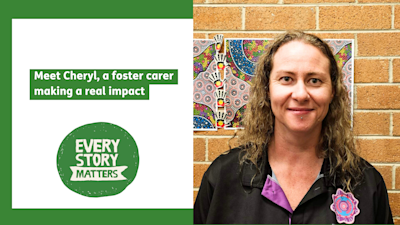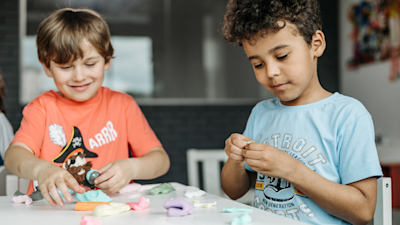Foster carers are needed across Australia.

Image: A man and a woman sit cross-legged on the ground, either side of a child.
Life Without Barriers is calling on kind-hearted and compassionate Aussies to step up and become foster carers for children with complex needs. These kids have faced tough times, and we need your help to give them the love, care, and support they deserve.
Sometimes, a child's significant needs can lead them into the care system. These needs might revolve around living with disabilities, be they physical or intellectual, serious medical conditions, or displaying pain-based behaviours that are tough to manage. It's not always an easy road for these little ones, and the intersection of their complex needs makes them more vulnerable.
In fact, caring for kids with significant disabilities or medical needs can add stress and strain, leaving them more exposed to risks like abuse and neglect. And for those children who have endured trauma due to abuse, neglect, or family violence, it can be even tougher for them to find positive and safe environments for healing and growth.
Statistics show that children with complex needs, such as significant disabilities, are more likely to enter the care system. However, when we have awesome foster carers like you, we can turn these statistics around and give these kids a chance to thrive.

Image: A man and a child with disability laugh together in a kitchen.
Who are children in care?
Children in care are ordinary kids who've had some extraordinary experiences. They've got hopes, dreams, and aspirations like any other young person out there. With your support, they can achieve great things!
Children in care are aged between 0 and 17 years, and they come from all walks of life. We know it's vital for them to stay connected to their culture and identity, and that's where you come in.
We do our best to match kids with carers from similar cultural and linguistic backgrounds. If that's not possible, we help the kids stay connected to the languages, cultures, and religious practices that are close to their hearts.

Image: A young girl and boy sit together on a hammock outdoors.
Aboriginal and Torres Strait Islander children are 10 times more likely to have a care experience than non-Indigenous kids. But we're committed to following the Aboriginal Placement Principles, keeping these young ones on Country and in community.
When children are in care, their families are still important to them. These kids need their parents, siblings, and other family members to be part of their lives whenever it’s possible. That's why we always support families and carers to build strong relationships in the best interests of the children.
We know these kids have faced some tough times, which can lead to trauma. Being removed from their family can cause real heartache. Being away from the people they know and love, losing connections with friends, school, and their old life can be tough. That's where you come in. You can be the safe space they need to express their feelings and start healing.

Image: A man and woman are holding a toddler. They are all looking at the camera.
Children with disabilities
Children with complex needs may require significant support, especially when diagnosed with disabilities, medical conditions, or dealing with trauma. It's not always easy for them to communicate their needs, so it takes experienced and caring individuals to learn new skills and build strong connections.
Young people in care might have more health or therapeutic appointments than most. That means carers need to be flexible and available to provide the support they need. It might even involve handling alternate schooling arrangements, like part-time attendance.
Support children with a disability might need:
physical support
behavioural support
health support
emotional support
family support
therapeutic support
day support
financial support
advocacy
transport
"It is one of the most rewarding experiences you can have, teaching you something new every day." Andrea and Colin, complex need foster carers.

Image: A woman sits on a couch with a child on her lap.
What is CARE?
At Life Without Barriers, we believe in using evidence to guide the best opportunities for these children. We use an evidence-informed, therapeutic model of care from Cornell University, grounded in the six principles of CARE: Creating Conditions for Change.
This approach focuses on building strong relationships with children and their families, helping kids develop new skills, and guiding interactions that lead to positive changes in their lives. It's all about teamwork, making decisions in the best interests of the children, and having a shared language and understanding.

Image: A woman and a boy sit on a couch talking.
What makes a great foster carer?
Now, let's talk about what makes a fantastic foster carer. Our foster carers have patience, warmth, and empathy. You need to be open to learning new things every day, and that means asking for help when you need it. There's no shame in not knowing it all – your Life Without Barriers care team is there to support you!
And when it comes to these young people, you need to be curious and eager to understand why they do what they do. They might have experienced some tough times, but with your love and support, they can grow and thrive.
It's important to know that fostering is different from parenting your own children. You need the time, space, and emotional availability to provide the attention and attachment these kids need. Family is always important to them, and that includes exploring their family connections and stories, even if they can't be together.
Children with a disability have the same rights and needs as other children, they need:
a loving home
a community
an education
a pathway to employment
a family
a network of friends

Image: A teenage girl and a woman sit side by side on the carpet in a loungeroom.
So, could you be a foster carer? You will need to meet the age requirements for your state, be well and healthy, have a regular source of income, and be open to undergoing background checks. You can be single, in a relationship, with or without your own children – it's your caring heart that truly counts.
And what about your home and family? You will need a spare room in most cases. It doesn't matter if you're renting, own your home, or paying it off – as long as your place is safe and suitable for a child or young person.
When you're caring for children or young people with complex needs, being an advocate for their needs is important. You'll need to know what supports are available for them - if you've got experience working with or caring for children, people with disabilities, or medical needs, that is a huge help!
The process to become a foster carer starts with a chat with the Life Without Barriers team.
Once you're feeling ready to commit to foster care, our local carer recruitment teams will take you through the process of background checks, initial training and carer assessment. We'll work with you to ensure fostering is right for you right now. If it's not the right time for you now – you can take your time and decide when you're ready.
Once you decide to start your foster care journey, we'll provide you with the knowledge and skills you need, and it doesn't stop there. Your learning journey continues with ongoing training, support groups, and access to a 24/7 helpline in case you need help at any time.
So, if you've got the heart, the time, and the willingness to open your home to a child in need, apply to become a foster carer at Life Without Barriers.
Together, we can make a real difference in the lives of these extraordinary kids, one loving home at a time.

Image: A man sits with a girl, a boy and a dog, reading a book.
Got a question? Could you be a carer? Here are some of our most frequently asked foster care questions!
I am single, can I foster?
Yes. Families come in all shapes and sizes, as do our foster families.
We are an LGBTQIA+ couple, can we foster?
Of course. Life Without Barriers values a diverse community of Foster Carers.
Can I foster even though I don’t have my own children?
Yes. We know that having experience interacting and caring for children is useful when new to fostering, but that can be gained in many ways other than parenting. Even if you’ve never cared for children, having personal attributes that would make you a good carer is what we look for.
Do I need to have a spare room?
In most instances, yes.
Do I have to own my home to be a foster carer?
No, however, you need to demonstrate that your premises are safe and suitable to foster. You can be renting, in public housing, paying off your home or own your home outright.
Will all my family be involved in the assessment process?
Yes. Everyone in your household will be part of the assessment process. It is important to make sure everyone knows what fostering is and is on board with the decision to apply.
How are children matched to foster carers?
By getting to know you well, we can ensure that children matched to carers are those that they are able to best support. We consider their unique needs and parts of their identity that might be a good fit with your family to help create a sense of belonging.
Can I choose the age and gender of the child?
Our assessors work with you to recommend the best fit, considering your skills, preferences, and household dynamics regarding the age, gender and needs of the children you are approved to care for. It’s important to keep in mind that having very specific preferences regarding age and gender can make it more difficult to make a good match.
Keen to learn more? Get in touch today with our carer team today; call 1300 592 227 or email carers@lwb.org.au


